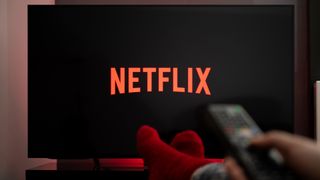
Netflix has confirmed that an ad-supported subscription tier is coming to the platform in “the early part of 2023", and while we’ve previously suggested that its introduction will be a good thing for the waning streaming service, we’re beginning to build a more detailed – and potentially concerning – picture about what this new tier might actually look like.
Speaking as part of the company’s second-quarter earnings interview, Netflix co-CEO Ted Sarandos confirmed that the streamer’s upcoming ad-supported tier won’t include every movie and TV show currently available on the standard version of Netflix.
"Today, the vast majority of what people watch on Netflix, we could include in the ad-supported tier today," Sarandos said. "There are some things that [wouldn't be included] – that we are in conversation with the studios on – but if we launched the product today, the members in the ad tier would [still] have a great experience. And we will clear some additional content, but certainly not all of it.”
It’s not entirely clear whether Sarandos’ admission refers to the streamer’s ad-supported tier in its infancy (i.e. first few months post-release) or indefinitely, but it’s evident that Netflix customers who decide to opt in to the new subscription package won’t enjoy exactly the same level of access to content as those paying for Netlflix proper – at least to begin with.
“As Ted says, we can launch today without any additional content clearance rights,” Netflix CFO Spencer Neumann added in the same interview. “Hopefully we can supplement that, but we’ll be disciplined in what we do.”

We know that Netflix-produced originals like Stranger Things and Bridgerton will absolutely be included in the streamer’s ad-supported tier, and, as per the Wall Street Journal, the company remains in negotiations with Universal, Warner Bros. and Sony Pictures Television for the rights to broadcast ad-supported versions of licensed properties including You, Russian Doll, The Crown and Cobra Kai.
In all likelihood, Netflix will secure these rights ahead of the new tier’s launch – as above, Sarandos has said that “conversation[s] with studios” are ongoing – but the question remains: what type of content won’t be included?
Get daily insight, inspiration and deals in your inbox
Get the hottest deals available in your inbox plus news, reviews, opinion, analysis and more from the TechRadar team.
According to the WSJ, older (but still popular) shows like Breaking Bad and NCIS are also the subject of these aforementioned negotiations, so we’d expect Netflix’s vast movie library to bear the brunt of its “disciplined” approach to securing ad-supported broadcast rights. In reality, then, “certainly not all [content]” may simply mean reduced access to off-beat movies that haven’t proven particularly popular on Netflix as we know it today.
Since every regional version of Netflix boasts a different library, we’re not able to say what these left-behind titles might be, at this early stage, but we’ll keep our ear to the ground in preparation for the ad-supported tier’s launch early next year.
For more Netflix-related content, check out our report on the streamer's new plan to tackle password sharing and our thoughts on its spatial audio upgrade.

Axel is a London-based Senior Staff Writer at TechRadar, reporting on everything from the latest Apple developments to newest movies as part of the site's daily news output. Having previously written for publications including Esquire and FourFourTwo, Axel is well-versed in the applications of technology beyond the desktop, and his coverage extends from general reporting and analysis to in-depth interviews and opinion.
Axel studied for a degree in English Literature at the University of Warwick before joining TechRadar in 2020, where he then earned an NCTJ qualification as part of the company’s inaugural digital training scheme.
Most Popular

